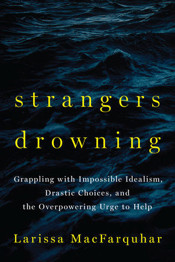Strangers Drowning: Grappling with Impossible Idealism, Drastic Choices, and the Overpowering Urge to Help

This is a book about Do Gooders – people who are compelled to help other people, often to a fault. The book is a series of stories about these people. These are people that sacrifice their happiness and sometimes their lives, to make life better for others.
The book is a study in some of these peoples’ inability to moderate goodness, and their nihilism at their inability to placate or silence evil or suffering.
The people described in the book almost suffer from neurosis or mania. They pursue good relentlessly, obsessively, at great cost to themselves, and seemingly little joy. One woman hated receiving money as a gift, but she felt compelled to donate it. Other gifts, she would sell. She seemed to do this out of compulsion.
The motto among this group is: “If I can do X, then shouldn’t I also do Y and Z?” The core question becomes, “How much is enough?”
As humans, we have trouble with moderation. I see this a lot with dieting dysfunction. People embark on perfect diets. Later, when the novelty wears off, the have trouble moderating the introduction of reality. If they were perfect for one meal, shouldn’t they be perfect for another? if they got down to 1,000 calories, wouldn’t 800 be better? Eventually, they burn out because they don’t know where to draw the line between healthy eating and mania.
It’s the same with altruism. Can you sit on your couch watching Netflix while people starve? Well, only if they’re strangers, but not if they’re family, right? (Hence, the title.) If they’re family, we would be up in arms. But is that logical? If anyone, anywhere is starving, shouldn’t we do something about it?
Someone, somewhere, at every moment of the day, is suffering. Where is the line between a situation I care enough about to act on, and one from which I feel detached? What does it say about me, in regard to where I draw that line and why?
Ultimately, the book is depressing. I found it hard to read, both because the situations were nihilistic, and it honestly made me feel badly about how I worry about First World Problems. Should I be more proactive about the bad things in the world? Am I too complacent?
It left me conflicted. I want to do good. As a human, think I do.
But I could do more. We all could.
Should we?
Book Info
- I have read this book. According to my records, I completed it on .
- A hardcover copy of this book is currently in my home library.